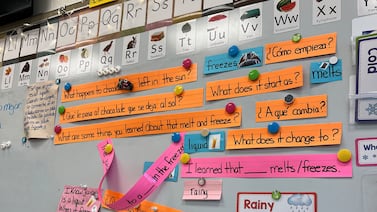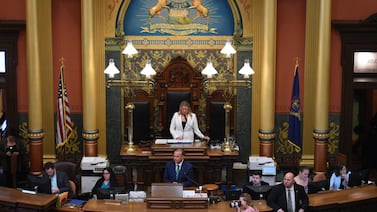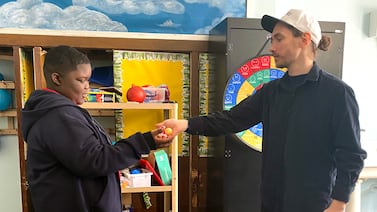Sign up for Chalkbeat Philadelphia’s free newsletter to keep up with the city’s public school system.
More than 55,000 students across Philadelphia could have a harder time getting to class when the school year begins next month because of planned cuts to the region’s public transit system.
Students in Northeast Philadelphia could be particularly hard hit by the proposed 20% reduction in SEPTA service, scheduled to begin on August 24, the day before school starts.
The expected cuts will impact bus and rail lines that directly serve more than 25 district schools, according to a SEPTA analysis. Several bus lines that specifically serve schools at the beginning and end of school days, called the 400 series, are part of the planned cuts.
SEPTA officials have said the reductions are necessary to address a severe funding shortfall and reduce its deficit.
For a school district that relies on SEPTA to transport middle and high school students, those changes could mean major challenges.
Teachers, school staff, and parents who use SEPTA to get to school will also likely experience longer commutes, according to Jody Holton, chief planning and strategy officer at SEPTA.
“Across the whole system, there is going to be crowding, there’s going to be reliability issues,” Holton said. “Even if your service isn’t being eliminated, there will be ramifications.”
As lawmakers continue to negotiate the state budget, which was due on June 30, there is a chance more funding could forestall the cuts. But SEPTA officials say they’re planning for the worst.
For the first time, the transportation authority is creating two different schedules to release next month. One will reflect the planned cuts, while the other will show what’s possible if SEPTA gets more money from the state.
A school district spokesperson said it is too early to comment on the potential impacts of route eliminations.
Philadelphia middle and high school students rely on SEPTA for school transportation
In Philadelphia, students in grades 7 through 12 who live at least 1.5 miles from their school are eligible for free SEPTA cards through the school district. The district generally expects those students to use SEPTA to get to school, and does not permit them to ride on yellow school buses, which are mostly reserved for elementary school students. Students with disabilities may get access to buses or other transportation services as well.
At last month’s board meeting, the school board approved a $34 million contract with SEPTA covering 63,000 fare cards for students from public, charter, and non-public schools for the coming school year. The state reimburses the district for the cost of the passes through a transportation subsidy program.
From 7 a.m. to 9 a.m., 1 in 3 SEPTA riders are students, according to Stephen Bronskill, the coalition manager of Transit Forward Philadelphia, a coalition advocating for better public transportation. The proposed cuts will make those students’ commutes much less efficient, he said.
“Tons of students won’t have access to reliable transit on a daily basis,” said Bronskill in an email. “Others will have to deal with serious delays.”
The changes include eliminating 10 of SEPTA’s 400 series bus lines, which act as a kind of extension to other lines to reduce crowding and make students’ commutes more efficient at the beginning and end of the school day.
Without those lines, students will have to either walk to a different bus stop or make more transfers, according to Melissa Silverman, SEPTA’s director of schedules and support services.
Students in the Northeast will be hit particularly hard
Though the planned SEPTA service cuts will be felt across the Philadelphia region, the worst effects are expected to hit Philadelphia’s Northeast neighborhoods, according to Holton, SEPTA’s chief planning strategy officer.
The area, Holton said, is lower density and therefore more difficult to serve with public transit. But Northeast Philadelphia is also where SEPTA has a high proportion of school ridership on buses, meaning that students will weather the impact of the cuts.
Already, students in the Northeast generally experience longer school commutes, according to research from 2020. That study, which analysed data from the 2017-2018 school year, found that the average high school student in the Philadelphia school district had a public transit commute of just under 30 minutes.
But students in the Northeast and Northwest spent longer getting to and from school, the researchers found, which likely reflected the more limited transit options in those regions of the city. Students attending citywide schools also had longer commutes than those at neighborhood schools.
“Based on the extent of the proposed service reductions, the time and complexity of high school students’ commutes are sure to increase,” Molly Pileggi, one of the study’s researchers, told Chalkbeat in an email. She added that students who traverse farther across the city will likely need to find different connection options and wait longer.
In the meantime, several Philadelphia lawmakers continue to advocate for more state funding for SEPTA to avert the cuts.
“For many families in Philadelphia, SEPTA isn’t optional, it’s how kids get to school and parents get to work,” said state Sen. Christine Tartaglione, who represents part of Northeast Philadelphia, in a statement. “Cutting service or raising fares would hurt families who are already doing everything they can to stay afloat.”
Rebecca Redelmeier is a reporter at Chalkbeat Philadelphia. She writes about public schools, early childhood education, and issues that impact students, families, and educators across Philadelphia. Contact Rebecca at rredelmeier@chalkbeat.org.







